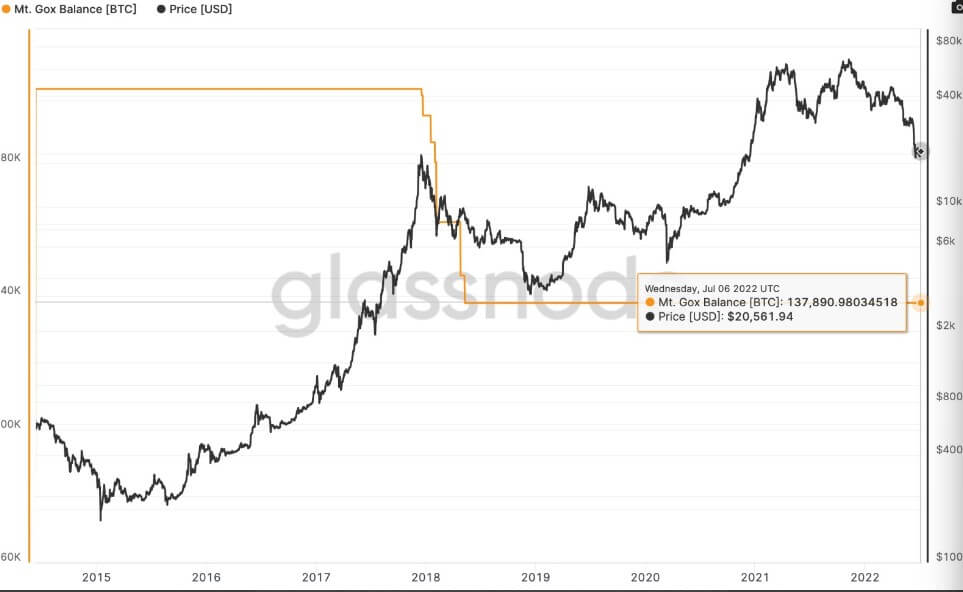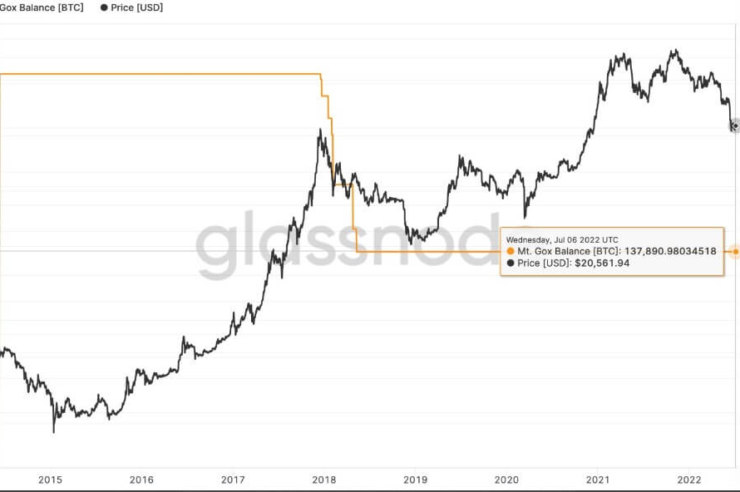137,000 BTC worth roughly $2.8 billion will soon be released into the market as funds lost to the Mt. Gox hack of 2011 and subsequent loss of 850,000 BTC worth around $17.8 billion at today’s price. In 2014 Mt. Gox reported that it had found 200,000 BTC, but those coins have been locked in litigation until now.
In November 2021, Mt. Gox released a formal “Rehabilitation Plan” to return lost funds to investors who lost access to their crypto some 7 years ago. Then, on July 6, 2022, Mt. Gox and “Rehabilitation Trustee” Nobauaki Kobayashi sent an email to creditors giving them the option to receive USD, BTC, or BCH. The news brings us closer than ever to funds finally being released to creditors.
Will the Mt. Gox coins affect Bitcoin’s price?
As a crypto analyst and Crypto Banter host, Miles Deutscher, pointed out, many investors are worried that the release of 137,000 BTC could cause a devastating decline in the price of Bitcoin due to increased sell pressure.
24/ Creditors have the option of receiving USD, $BTC or $BCH. It’s estimated that creditors will start receiving funds as early as August.
Many people are panicking that the release of these funds will lead to a huge supply-dump, which could significantly impact the $BTC price.
— Miles Deutscher (@milesdeutscher) July 9, 2022
Some have even theorized that a drawdown in Bitcoin’s price could align with the Ethereum merge, leading to “The Flippening” being realized. The Flippening is a hypothetical event where Ethereum overtakes Bitcoin in market cap, and it could happen if Bitcoin dropped to $10,000, with Ethereum rising by 30% from its current price.
The Ethereum Merge is timed perfectly with Mt. Gox users dumping ~140k BTC (~$3 billion) in late August 2022.
The Flippening is upon us frens.
— EthereumJesus.eth⟠🙌🏻🦇🔊🐼 (@EthereumJesus) July 7, 2022
However, the fears may be unfounded as many creditors have already sold their claims to crypto funds. Groups such as Fortress Investment Group LLC offered creditors an early payout of between $600 and $1,300 in cash. Michael Hourigan, managing director at Fortress, was quoted as saying;
“Rather than waiting another 1 to 1.5 years, we are offering a liquidity option for creditors who want to receive cash or BTC now.”
Further, creditors who have not already taken an early settlement may be unwilling to liquidate their Bitcoin as they represent early crypto believers immediately. It is reasonable to suggest that many of those receiving a Bitcoin payment would be more likely to send it to cold storage than sell it when Bitcoin is down over 60% from its all-time high.
It is possible that some of the released funds could find their way into alt-coins such as Ethereum, which has its most significant moment in history on the horizon. Before 2014, there were little to no alternatives to Bitcoin, whereas in 2022, tens of thousands of crypto projects could see an influx of investment.
What if the Bitcoin is liquidated?
Some of the Bitcoin has already been sold before the upcoming release of Bitcoin. In 2018, 24,658 BTC (worth $260 million at the time) was sold by Kobayashi during a creditors’ meeting. The sale
“was necessary and appropriate to procure a suitable amount
of money to secure the interests that the creditors for the principal amount and delay damages of the determined and undetermined bankruptcy claims.”
The liquidation marked the top of the 2017 bull run, as seen from the chart below. The price of Bitcoin fell following the decline in the number of Bitcoins held by Mt Gox, leading to the 2018 bear market from which it did not recover until late 2020.


Should the release of the remaining Mt Gox funds have a similar effect on the price of Bitcoin, it would likely drop below $10,000. However, even in recent months, there has been equal sell pressure on Bitcoin from parties such as Luna Foundation Guard, Three Arrows Capital, and Bitcoin miners.
LFG sold several billion dollars worth of Bitcoin, which had a negligible effect on Bitcoin as the market absorbed the selling pressure. The following weeks since the event did result in Bitcoin’s price decline due to a change in market belief and overall global outlook. The markets may well absorb any selling from Mt. Gox creditors, but the social sentiment of early Bitcoiners relinquishing their coins could create a bearish psychological sentiment.






















Comments (No)